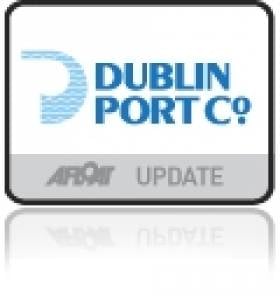Displaying items by tag: Ghana
RMR Shipping Increase Irish-West African Sailings
Dublin Port Company has welcomed RMR Shipping's new increased frequency of its service to West Africa, from a monthly to fortnightly service starting next month, writes Jehan Ashmore.
The direct service which began in 2009 using a single vessel from the capital to Nigeria, Ghana with calls to Lagos and Takoradi, is set to gain a second ship as demand for the service rises.
Two 157-trailer capacity ro-ro sisters are to be deployed on the route, they are the 23,000 gross tonnes sisters Celandine and Celestine. The Belgium-flagged pair both built in 2000 will take 18-days to transit between Dublin and Ghana.
The next sailing to Dublin is due on 5 July when the Celandine (PHOTO) is to dock at berth 51a, which is one of three berths located in the ports multi-user ferryport Terminal 1, shared by Irish Ferries, Stena Line and seasonal services of the Isle of Man Steam Packet Company.
Commenting on the development, Eamonn O'Reilly, Chief Executive Dublin Port Company said: "We are delighted with this development. Anything which increases the link between Ireland and emerging economies beyond Europe has got to be good for exports.
He added, "The service to Takoradi complements our involvement with Irish Aid from 2008 to 2010 in delivering an international training programme for ports in emerging countries including Ghana. The TrainForTrade programme was delivered with UNCTAD and we are hopeful of being able to announce a follow-up to the first programme in the coming months.
The development of RMR Shipping on the direct sea freight link was also welcomed by the Irish Exporters Association (IEA) whose chief executive John Whelan commented that exports to Nigeria last year exceeded €200m, the second largest market for Irish goods into Africa.
Dublin Port Company Trains Five Developing Countries
Representatives of Tanzania, the Maldives, Ghana, Indonesia and Malaysia have benefited from the experience of Ireland's largest and most successful port management company.
Dublin Port Company today announced it has completed a training programme for five developing countries as part of its UN-appointed role under UNCTAD's TrainForTrade programme.
Efficient maritime transport and port services are essential for creating sustainable economies in the developing world. The TrainforTrade programme helps ports in developing countries build better local economies by attracting and generating greater trade volumes using improved commercial handling practices learned from their training partner. In 2007, Dublin Port Company was chosen as the United Nation's partner to deliver training to ports in English-speaking countries in the developing world.
Representatives from the ports of Tanzania, the Maldives, Ghana, Indonesia and Malaysia, who have successfully completed their Train for Trade programme were today presented with their certificates by the Minister of State for Overseas Development, Mr. Peter Power TD, at a ceremony in Dáil Éireann.
Speaking at the presentation of certificates to course participants, Minister of State for Overseas Development, Mr. Peter Power, TD, said: “I congratulate Dublin Port Company on successful completion of UNCTAD’s TrainforTrade programme. Five ports in developing countries have benefited significantly from the skills and knowledge from Ireland’s largest and most successful port management company. This programme is important for improving trade in the developing world and driving economic growth.”
Responding to the Minister, Mr. Eamonn O'Reilly, Chief Executive, Dublin Port Company, said: "Dublin Port is proud to have been able to contribute to the UN's English-speaking pilot port training programme. We became involved in this initiative as part of our wider CSR programme and we hope that we have made a positive contribution and left a lasting legacy to help developing countries build stronger, more efficient ports for the future."
Dublin Port Company is a self-financing, private limited company wholly-owned by the State, whose business is to manage Dublin Port, Ireland's premier port. Established as a corporate entity in 1997, Dublin Port Company is responsible for the management, control, operation and development of the port. Dublin Port Company provides world-class facilities, services, accommodation and lands in the harbour for ships, goods and passengers.
Located in the heart of Dublin City, at the hub of the national road and rail network Dublin Port is a key strategic access point for Ireland and in particular the Dublin area. Dublin Port handles over two-thirds of containerised trade to and from Ireland and 50% of all Ireland's imports and exports, making it a significant facilitator of Ireland's economy. Dublin Port also handles over 1.5 million tourists through the ferry companies operating at the port and through cruise vessels calling to the port.
























































